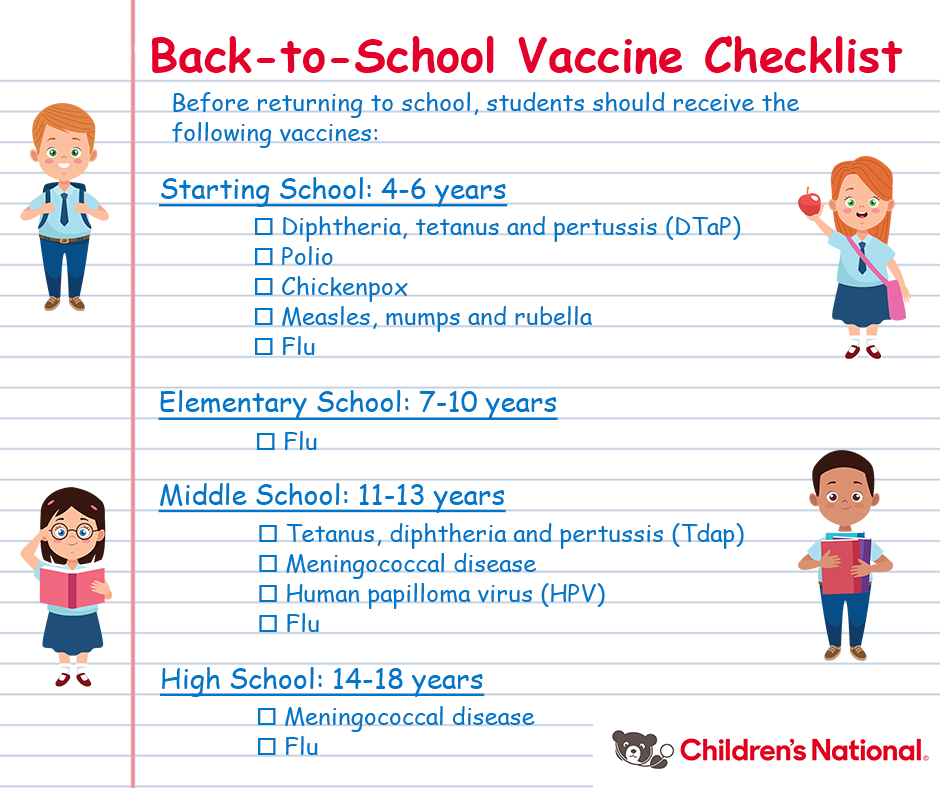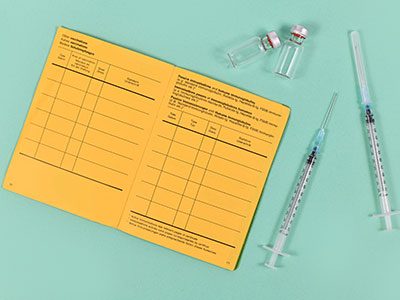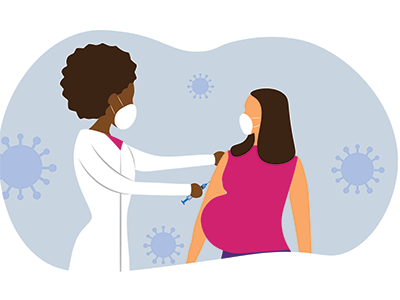Back-to-school time is a great time to ensure all your child’s vaccines are up to date. In fact, many school systems require children to be vaccinated to attend school. To ensure your child is up to date on their vaccinations, make an appointment with their primary care physician. Not having the proper vaccines could cause your child to get sick and miss valuable school time.
Why does my child need to be vaccinated?
Over the past several months, there has been a significant drop in childhood vaccination rates, which is not good at all. Timely vaccination is a cornerstone of good pediatric health and infectious disease prevention.
Many vaccines are necessary because they not only protect your child, but also everyone else from contracting a virus. If a large group of children are not vaccinated, illnesses can resurface and have serious lifetime effects on the general population.
Starting school: ages 4 through 6
If your child received all their appropriate vaccines by the time they were 4 years old, from ages 4 through 6, they will need additional doses of vaccines against the following diseases:
-
- Diphtheria, tetanus and pertussis (DTaP)
- Polio
- Measles, mumps and rubella (MMR)
- Varicella (chickenpox)
- Flu
If your child has missed any vaccines, work with your pediatrician to make sure they caught up.
Elementary school: ages 7 through 10
From ages 7 through 10, your child should continue to get a flu vaccine every year. If your child had all their recommended vaccines through age 6, it’s not necessary to get additional doses during these years. However, if your child has missed any vaccines, work with your pediatrician to make sure they get caught up.
Middle school: ages 11 through 13
During early adolescence, your child needs vaccines against the following diseases:
-
- Tetanus, diphtheria and pertussis (Tdap)
- Meningococcal disease
- Human papilloma virus (HPV)
- Flu
High school: ages 14 through 18
Children need an additional dose of meningococcal vaccine at age 16, and they need the flu vaccine every year from 14 through 18.
Why does my child need the flu vaccine?
While vaccination against the flu is not required by schools, it is strongly recommended. Many parents wonder if the vaccine could cause their child to be more susceptible to contracting the flu. The flu is a serious, sometimes life-threatening illness, and there is no evidence that indicates a child will contract the flu from a flu vaccine. In fact, the risk of contracting the flu is much higher the longer a child goes without his or her flu vaccine.
Parents are often unaware of the serious threat the flu can pose to a young child. Children under the age of 5 who contract the flu are at risk of being hospitalized, as the virus is more difficult to fight off in a younger immune system. Additionally, the flu vaccine is only effective for the season when it was received, not the entire year, so children must be vaccinated annually to stay protected.

Download our back-to-school vaccine infographic here.
 https://riseandshine.childrensnational.org/wp-content/uploads/2020/11/person-being-vaccinated-feature.png
300
400
Rise and Shine
https://riseandshine.childrensnational.org/wp-content/uploads/2017/11/childrens_riseandshine_logo.jpg
Rise and Shine2025-05-15 07:00:242025-05-23 10:39:33Answers to your questions about the COVID-19 vaccine and booster for children
https://riseandshine.childrensnational.org/wp-content/uploads/2020/11/person-being-vaccinated-feature.png
300
400
Rise and Shine
https://riseandshine.childrensnational.org/wp-content/uploads/2017/11/childrens_riseandshine_logo.jpg
Rise and Shine2025-05-15 07:00:242025-05-23 10:39:33Answers to your questions about the COVID-19 vaccine and booster for children





















Leave a Comment
Want to join the discussion?Feel free to contribute!